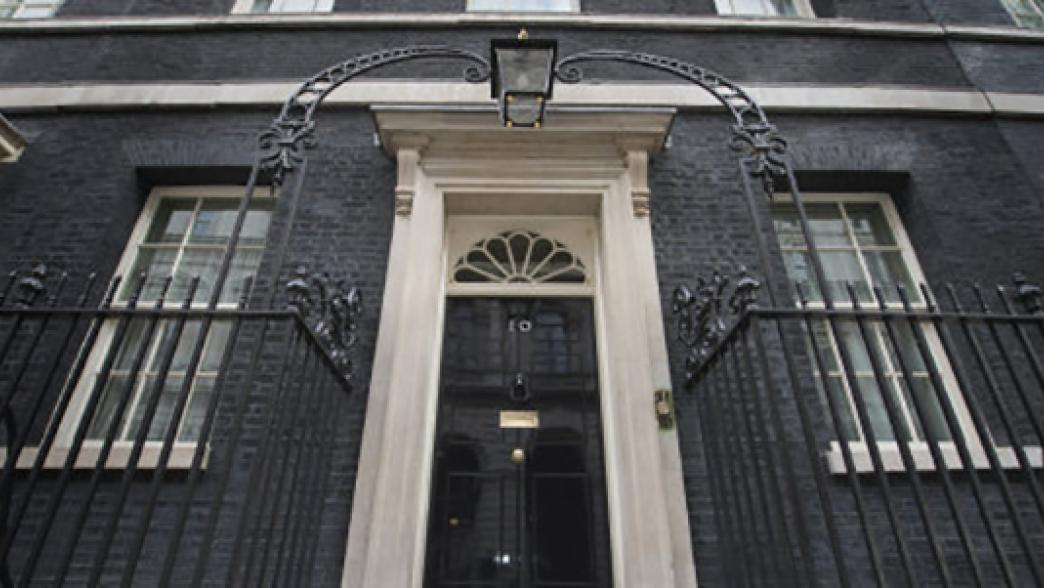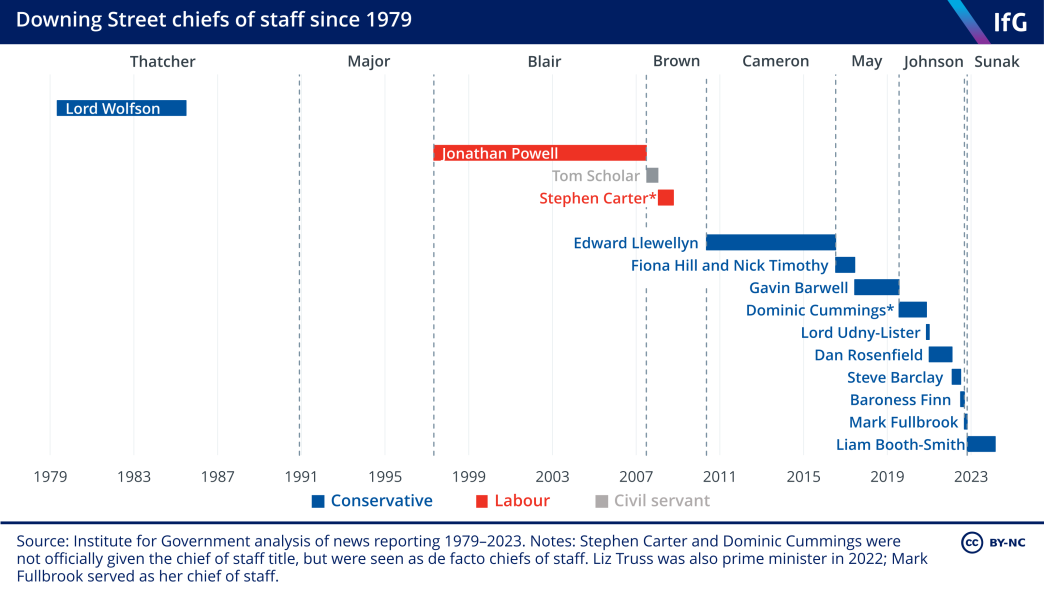Downing Street chief of staff
The Downing Street chief of staff is the UK prime minister’s most senior political adviser.

What does the Downing Street chief of staff do?
The Downing Street chief of staff is the UK prime minister’s most senior political adviser. Chiefs of staff are sometimes, but not always, political appointees with close links to the political party in government at the time.
The role is extremely influential. Chiefs of staff advise the prime minister on a wide range of issues, including government policy, party politics and communication strategies. The chief of staff would also normally oversee and manage Downing Street political staff and the work of special advisers across government.
The duties of the role vary considerably depending on the skills, previous experience and character of the chief of staff, as well as the preferences of the prime minister. In an event at the Institute for Government, Lord Barwell, chief of staff under Theresa May, said that “by definition, there can’t be a job description”. He did, however, detail what he saw as seven key aspects of the role in his Ministers Reflect interview:
- Being the prime minister’s most senior political adviser
- Managing other political advisers
- Working closely with the prime minister’s principal private secretary
- Working with the wider team of private secretaries to try to get the government machine to do what the prime minister wants
- The gatekeeper role: sitting outside the prime minister’s office and controlling who gets in and who doesn’t
- Seeing what the prime minister sees, and accompanying them to meetings
- Brokering deals with other ministers
Who is the current chief of staff?
Liam Booth-Smith is the current Downing Street chief of staff. He served as an adviser to Rishi Sunak during his time as chancellor, having previously worked for housing secretary James Brokenshire and Boris Johnson in No 10. 36 Ellery B, ‘How the Treasury Travolta became Rishi Sunak’s most trusted ally’, The Times, 29 September 2023, retrieved 27 February 2024, www.thetimes.co.uk/article/liam-booth-smith-rishi-sunak-advisor-no-10-3g8zktkkn He ran both of Sunak’s Conservative leadership bids in 2022.
How and when did the chief of staff role arise?
The ‘chief of staff’ title is originally a military term. In 1953, President Eisenhower became the first US president to appoint a political chief staff, and the role has continued in the US ever since. 37 Whipple C, The Gatekeepers: How the White House Chief of Staff Define Every Presidency, Crown Publishing Group, 2017. Margaret Thatcher was the first UK prime minister to appoint a chief of staff – David Wolfson (later Lord Wolfson) – in 1979. Wolfson had been director of Great Universal Stores, and then secretary to the shadow cabinet, prior to his appointment. He was one of Thatcher’s closest aides, describing his job as “making her aware of the few things that mattered and to make sure she saw the right people at the right time.” 38 The Times, ‘Lord Wolfson of Sunningdale obituary’, The Times, 12 March 2021, retrieved 7 February 2022, www.thetimes.co.uk/article/lord-wolfson-of-sunningdale-obituary-sczj79mm5 Wolfson left the role in 1985 and the position was left vacant.
Tony Blair re-introduced the chief of staff role to Downing Street when he became prime minister in 1997, appointing Jonathan Powell, who had previously worked as a senior diplomat.
Unlike political appointees before him, Powell was given unprecedented powers to issue orders to civil servants. 39 Assinder J, ‘Profile: Jonathan Powell’, BBC News, 14 July 2004, retrieved 7 February 2022, news.bbc.co.uk/1/hi/uk_politics/3893065.stm He wielded considerable influence during his 10 years, playing an important role in negotiating the peace process in Northern Ireland. 40 Assinder J, ‘Profile: Jonathan Powell’, BBC News, 14 July 2004, retrieved 7 February 2022, news.bbc.co.uk/1/hi/uk_politics/3893065.stm
Who else has been Downing Street chief of staff?
When Blair resigned, Powell stood down as chief of staff. Gordon Brown experimented with different models of the chief of staff role during his time as prime minister. First, he temporarily appointed civil servant Tom Scholar (later Sir Tom Scholar) as both Downing Street chief of staff and his principal private secretary, marking a move away from Blair’s introduction of a US-style chief of staff.
In January 2008, at the point of Scholar’s planned departure, senior civil servant Jeremy Heywood (later Lord Heywood) took on the principal private secretary role and Stephen Carter (later Lord Carter), formerly CEO of Ofcom, became chief of strategy and principal adviser to the prime minister – de facto chief of staff. 51 BBC News, ‘Brown appoints new chief of staff’, BBC News, 23 January 2008, retrieved 7 February 2022, news.bbc.co.uk/1/hi/uk_politics/7205248.stm Carter had been a member of the Labour Party prior to taking up his position at Ofcom, and rejoined the party upon his appointment as chief of staff. 52 Wintour P, ‘New strongman at No 10: Brown hires a high-flyer to help him back on course’, The Guardian, 8 January 2008, retrieved 7 February 2022, www.theguardian.com/politics/2008/jan/08/uk.gordonbrown
Carter only stayed in the post until October 2008 and, although it is sometimes claimed that Heywood became chief of staff for the remainder of Brown’s premiership, he told the IfG that this was not the case. The position was left vacant until Gordon Brown left office.
When David Cameron became prime minister in 2010, he appointed Conservative adviser Edward Llewellyn (later Lord Llewellyn), who had worked for him in opposition, as his chief of staff. Llewellyn was part of a small team that negotiated a coalition deal with the Liberal Democrats. 53 Henry R, ‘Coalition talks continue in Westminster’, The Times, 9 May 2010, retrieved 7 February 2022, www.thetimes.co.uk/article/coalition-talks-continue-in-westminster-zb97dgtx3h0
After David Cameron’s resignation and Theresa May’s appointment as prime minister in 2016, Conservative special advisers Nick Timothy and Fiona Hill became joint chiefs of staff. While at No.10, they gained a reputation in the media and among staff for exerting a tight grip on power on May’s behalf. 54 Elgot J and Mason R, ‘Nick Timothy and Fiona Hill: unelected advisers who ‘acted more like DPMs’’, The Guardian, 10 June 2017, retrieved 7 February 2022, www.theguardian.com/politics/2017/jun/10/nick-timothy-and-fiona-hill-unelected-advisers-who-acted-more-like-dpms When the Conservatives lost their majority in the 2017 general election, under pressure from the parliamentary party, they were replaced by former minister Gavin Barwell (later Lord Barwell). 55 BBC News, ‘Nick Timothy and Fiona quite No 10 after election criticism’, BBC News, 10 June 2017, retrieved 7 February 2022, www.bbc.co.uk/news/uk-40231107 Barwell has since written a book about his experience in No.10. 56 Barwell G, Chief of Staff: Notes from Downing Street, Atlantic Books, main edition, 2021
Boris Johnson did not appoint a formal chief of staff when he became prime minister in July 2019. However, Dominic Cummings, his chief adviser, was seen as his de facto chief of staff. 57 Morrison G, ‘Key players in Boris Johnson’s election campaign: From Dominic Cummings to Isaac Levido and Lee Cain’, Evening Standard, 13 December 2019, retrieved 7 February 2022, www.standard.co.uk/news/politics/boris-johnson-election-campaign-key-players-a4312441.html When Cummings left Downing Street amid internal turmoil in November 2020, Lord Udny-Lister – who had served as Johnson’s chief of staff when he was mayor of London – became the prime minister’s acting chief of staff, until Dan Rosenfield took over in January 2021.
Before becoming chief of staff, Rosenfield previously worked as a civil servant in the Treasury, acting as principal private secretary to chancellors of the exchequer Alistair Darling and George Osborne, and later as an investment banker. Despite his civil service background, Rosenfield was appointed politically as a special adviser by the prime minister. In February 2022, Rosenfield resigned, along with two other senior special advisers at No.10. In December 2021, it had been reported that Rosenfield had attended at least one of the Downing Street Christmas parties in December 2020. 58 Swinford S, Wright O, Zeffman H, Grylls G, ‘Christmas party row: Tories held ‘up to seven’ parties in lockdown’, The Times, 9 December 2021, retrieved 7 February 2022, www.thetimes.co.uk/article/no10-christmas-party-wine-gifts-quizzes-boris-johnson-allegra-stratton-vdbpghr52
The only sitting MP and government minister to have served as chief of staff was Steve Barclay, who held the role from February to July 2022 while serving as chancellor of the duchy of Lancaster, minister for the cabinet office, and MP for North East Cambridgeshire. This garnered considerable attention in the media and from the opposition, with questions raised as to how Barclay would find the time to fulfil all of the above roles. 59 Helm T, ‘Boris Johnson’s new aides are greeted with bafflement’, The Guardian, 5 February 2022, retrieved 7 February 2022, www.theguardian.com/politics/2022/feb/05/boris-johnsons-new-aides-are-greeted-with-bafflement; McGuinness A, ‘Questions raised over how Boris Johnson’s new chief of staff Stephen Barclay will mange three jobs at once’, Sky News, 6 February 2022, retrieved 7 February 2022, https://news.sky.com/story/questions-raised-over-how-boris-johnsons-new-chief-of-staff-stephen-barclay-will-manage-three-jobs-at-once-12534583; Topping S, ‘Angela Rayner labels new Number 10 appointment a ‘farce’ as she hits out at Boris Johnson’, Manchester Evening News, 5 February 2022, retrieved 7 February 2022, www.manchestereveningnews.co.uk/news/greater-manchester-news/angela-rayner-labels-new-number-23000755
After Steve Barclay resigned from the Johnson government in July 2022, Baroness Finn served briefly as chief of staff. When Liz Truss became prime minister in September 2022, she appointed Mark Fullbrook, a former adviser to Boris Johnson and founder of lobbying firm Fullbrook Strategies as her chief of staff. Fullbrook’s appointment was controversial given his lobbying background and plans made to pay him for the role through his firm. 60 Mason R, ‘Plan to pay Liz Truss’s chief of staff through firm is dropped after criticism’, The Guardian, 27 September 2022, retrieved, 27 February 2024, www.theguardian.com/politics/2022/sep/27/plan-to-pay-liz-truss-chief-of-staff-mark-fullbrook-through-firm-is-dropped

What is the difference between the principal private secretary to the prime minister and the chief of staff?
Whereas chiefs of staff are generally political appointees, the principal private secretary (PPS) to the prime minister is always a senior civil servant. The PPS heads the prime minister’s private office – which is made up of other civil servants – and manages the rest of the civil service team in No.10, while the chief of staff oversees the prime minister’s special advisers.
Before Tony Blair re-introduced the role of chief of staff, and granted his senior advisers the formal power to direct civil servants, the PPS to the prime minister was the most senior member of staff in No.10. However, this power was generally seen as unnecessary, as senior advisers can always use their position as a close adviser to the prime minister to get things done. Gordon Brown removed the chief of staff’s ability to formally direct civil servants, but subsequent chiefs of staff continued to be the most senior adviser to the prime minister.
Nonetheless, the PPS role remains fundamental to the successful functioning of No.10. Most teams in No.10 have seen the chief of staff work very closely with the PPS. Gavin Barwell told the Institute for Government that “you work really closely with the prime minister’s principal private secretary … to run the building. And I think that is about setting the tone”.
- Topic
- Ministers
- Keywords
- Civil servants
- Publisher
- Institute for Government